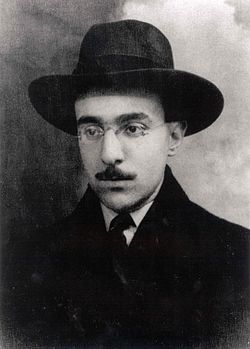Fernando Pessoa Quote
Suddenly I’m all alone in the world. I see all this from the summit of a mental rooftop. I’m alone in the world. To see is to be distant. To see clearly is to halt. To analyze is to be foreign. No one who passes by touches me. Around me there is only air. I’m so isolated I can feel the distance between me and my suit. I’m a child in a nightshirt carrying a dimly lit candle and traversing a huge empty house.
Fernando Pessoa
Suddenly I’m all alone in the world. I see all this from the summit of a mental rooftop. I’m alone in the world. To see is to be distant. To see clearly is to halt. To analyze is to be foreign. No one who passes by touches me. Around me there is only air. I’m so isolated I can feel the distance between me and my suit. I’m a child in a nightshirt carrying a dimly lit candle and traversing a huge empty house.
Related Quotes
This is a day of celebration!Today, we are divorcing the pastand marrying the present.Dance,and you will find Godin every room.Today, we are divorcing resentmentand marrying forgiveness.Sing,and God w...
Kamand Kojouri
Tags:
accept, acceptance, apathy, beloved, bitter, bitterness, celebrate, celebrating, celebration, ceremony
About Fernando Pessoa
Fernando António Nogueira de Seabra Pessoa (; Portuguese: [fɨɾˈnɐ̃du pɨˈsoɐ]; 13 June 1888 – 30 November 1935) was a Portuguese poet, writer, literary critic, translator, and publisher. He has been described as one of the most significant literary figures of the 20th century and one of the greatest poets in the Portuguese language. He also wrote in and translated from English and French.
Pessoa was a prolific writer both in his own name and approximately seventy-five other names, of which three stand out: Alberto Caeiro, Álvaro de Campos, and Ricardo Reis. He did not define these as pseudonyms because he felt that this did not capture their true independent intellectual life and instead called them heteronyms, a term he invented. These imaginary figures sometimes held unpopular or extreme views.
Pessoa was a prolific writer both in his own name and approximately seventy-five other names, of which three stand out: Alberto Caeiro, Álvaro de Campos, and Ricardo Reis. He did not define these as pseudonyms because he felt that this did not capture their true independent intellectual life and instead called them heteronyms, a term he invented. These imaginary figures sometimes held unpopular or extreme views.
